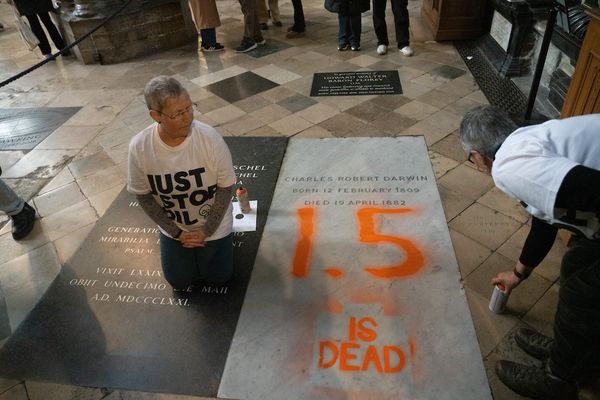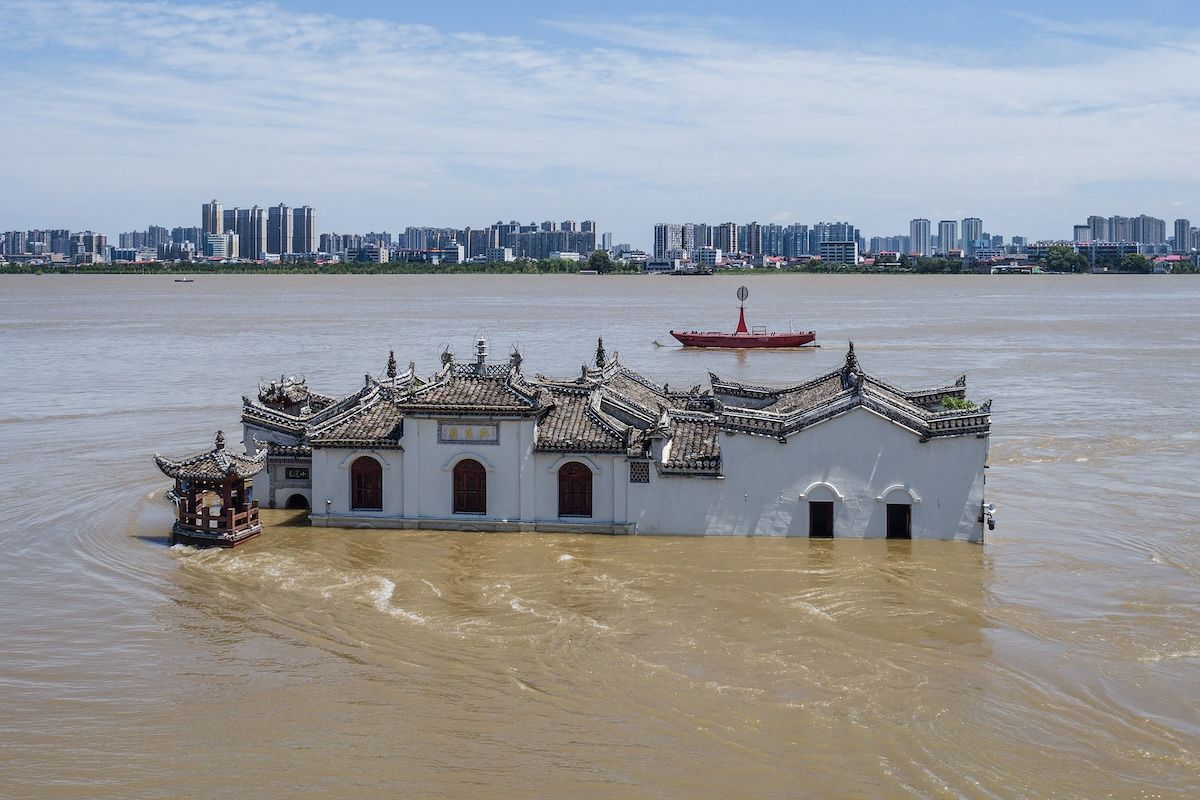2024 was a grim milestone in the history of our planet. Not only was it the hottest year in recorded human history, for the first time Earth’s average global temperature reached 1.5º C above pre-industrial levels. While it may seem like an arbitrary number, scientists who spoke with Salon agree: This is a warning sign for humanity that will be reflected in more disasters like hurricanes and wildfires.
The 1.5º threshold was established in 2015 during the Paris Climate Accords, with almost 200 nations agreeing to phase out fossil fuels and thereby keep the planet’s warming below 1.5º C above levels prior to the industrial revolution. Beginning in the 18th century, that period of rapid technological progress was marked by a surge in burning fossil fuels.
The scientific consensus is that climate change is the result of these industrial activities. Dr. Juan Declet-Barreto, a senior social scientist at the Union of Concerned Scientists (UCS), told Salon that he and his colleagues perceive the warming as a long-term trend and that extreme weather events like the ongoing Los Angeles wildfires will only get worse “if policymakers continue to be derelict in their responsibility to address the climate crisis.”
“The fossil fuel industry has a leading role in creating this hell that is causing death, destruction and misery all over the planet — and at home as we can tragically see unfold in front of us in Southern California,” Declet-Barreto explained.
"The fossil fuel industry has a leading role in creating this hell that is causing death, destruction and misery all over the planet."
Some scientists reacted to the news by saying it merely confirmed their darkest suspicions about our planet’s trajectory. Dr. Kyla Bennett, director of senior policy at the activist group Public Employees for Environmental Responsibility, told Salon that she and most other scientists paying attention expected humanity to blow past the 1.5º goal. Many people want to believe they can continue their carbon-intensive lifestyles without consequences, from vacationing using airplanes and eating meat and dairy to generally engaging in mass consumption.
“It is a myth perpetuated by the very corporations profiting from these purchases,” Bennett said. “Renewable energy is not a silver bullet; not only are they themselves environmentally destructive, but they will only result in more energy consumption. Indeed, in 2023, CO2 [carbon dioxide] emissions reached a new record high of 37.4 billion tonnes, despite the explosion of solar and wind.”
Bennett argues that climate change is not the underlying problem, but rather a symptom of “ecological overreach.”
NASA scientist @ClimateHuman :
'THIS IS ONLY THE BEGINNING…
These disasters will get much much worse…
It's going to be a nightmare that we can barely imagine… impacts to our food system… heat waves that kill millions of people in a matter of a few days…' #LosAngelesFire pic.twitter.com/fivpNNrsRT— Matthew Todd 🌏🔥 (@MrMatthewTodd) January 12, 2025
“We live on a planet with finite resources, and there are too many of us using too much,” Bennett said. “We are trying to solve the wrong problem: we have a resource consumption problem, not a fossil fuel problem. And I fear we, as a species, will never be ready to admit that and deal with it head on.”
Dr. Michael E. Mann, a professor of Earth and Environmental Science at the University of Pennsylvania, identifies the problem squarely as one of excessive fossil fuel use, albeit exacerbated by natural phenomena like El Niño.
“The wildfires out west and the devastating floods back east this past fall are a reminder of the damaging and deadly impacts climate change is already having,” Mann said. “It will all get worse if we continue to extract and burn fossil fuels.”
Prof. Joeri Rogelj, director of research at the Grantham Institute – Climate Change and Environment, Imperial College London, explained in a statement that the 1.5 degree threshold was established to limit human suffering. The news here therefore is not merely one involving scientific statistics; global warming has serious real-world consequences.
“A single year with temperatures 1.5° C above preindustrial levels does not mean we’ve reached 1.5° C of global warming,” Rogelj said. “However, it does mean we’re getting dangerously close.”
He added, “The Paris Agreement sets limits to global warming not out of convenience but out of the necessity to limit harm to and suffering of people. Even if we surpass 1.5° C in the long term, these reasons don’t change. Every fraction of a degree — whether 1.4, 1.5 or 1.6°C — brings more harm to people and ecosystems, underscoring the continued need for ambitious emissions cuts.”
The Los Angeles wildfires are the latest example of this crisis, with experts agreeing that climate change exacerbated the fires by first flooding the area, allowing tons of plants to spring up followed by unnaturally warm and dry conditions that created perfect fuel when the Santa Ana winds hit. As climate change worsens, weather will swing between extremes like an out of control pendulum. Even though California’s wildfire season typically runs from May through November, experts say the region is now experiencing a mid-January series of wildfires amidst the unusual and unnatural changes to the regional environment.
Want more health and science stories in your inbox? Subscribe to Salon's weekly newsletter Lab Notes.
"There is a lot of disinformation and misinformation being put out there by the fossil fuel industry."
“Some people are grasping for excuses as to why the fires are happening, playing the blame game,” Bennett said. “The blame lies squarely at the feet of fossil fuel companies and corporations pushing consumption of stuff. But for climate change, the fires in LA would not be what they are.”
As a member of the Union of Concerned Scientists, Declet-Barreto said “there is a lot of disinformation and misinformation being put out there by the fossil fuel industry. It is imperative for the public and policymakers to pay attention to the climate science that has unequivocally established that fossil fuel extraction and burning is the driving force behind the climate crisis.”
 Two Just Stop Oil activists spray paint '1.5 Is Dead' on the gravestone of Charles Darwin in Westminster Abbey on the 13th of January 2024, London, United Kingdom. Alyson Lee, 66, a retired teaching assistant from Derby and Di Bligh, 77, from Rode, wrote '1.5 Is Dead' using chalk paint as a reference to the newly published figures stating that 2024 was the hottest year on record. (photo by Kristian Buus/In Pictures via Getty Images)
Two Just Stop Oil activists spray paint '1.5 Is Dead' on the gravestone of Charles Darwin in Westminster Abbey on the 13th of January 2024, London, United Kingdom. Alyson Lee, 66, a retired teaching assistant from Derby and Di Bligh, 77, from Rode, wrote '1.5 Is Dead' using chalk paint as a reference to the newly published figures stating that 2024 was the hottest year on record. (photo by Kristian Buus/In Pictures via Getty Images)
In reference to passing the Paris threshold, on Monday the activist group Just Stop Oil painted on Charles Darwin’s grave in Westminster Abbey “1.5 is dead.” Just Stop Oil explained in a statement that “we have passed the 1.5 degree threshold that was supposed to keep us safe. Millions are being displaced, California is on fire and we have lost three quarters of all wildlife since the 1970’s.”
“What's really going on,” Just Stop Oil co-founder Roger Hallam told Salon in October “is the extraction of resources by the global elites, and the global elites are involved in a universal suicide project for humankind. We don't need to talk about the climate, we don't need to talk about change. What we need to talk about is power and criminality and evil. What we're talking about is a death project, and that's what we should call it.”
Read more
about climate change



Shares